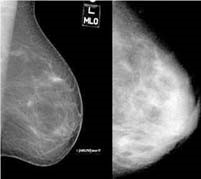Dense breasts have more fibrous and glandular tissue, which appear white on a mammogram. Cancerous tumors also appear white on a mammogram, making them difficult to identify within dense breasts. Fat appears black on a mammogram. This creates a greater contrast against "white" cancerous tumors, making them easier to identify within fatty breasts.

The leftmost photo above is the result of a mammogram on a breast with minimal density. It's darker, and it's much easier to spot a "white" cancer tumor. The photo on the right is an example of dense breast tissue - it's much harder to spot a "white" cancer tumor.
Approximately 40% of women age 40+ are categorized as having dense breasts. Having dense breasts increases your risk of breast cancer and lowers the likelihood of finding cancer while it is still in its early - and more treatable - stages.
At Montclair Breast Center, breast density classification and further possible risk factors are discussed with all patients by their examining physician on the day of their mammogram. Women with dense breasts often benefit from additional screening. To learn more about Dense Breasts and additional screening methods typically recommended, click here.
Find out if you have Dense Breasts. Join the Montclair Breast Center family by calling (973) 509-1818 to schedule an appointment.




